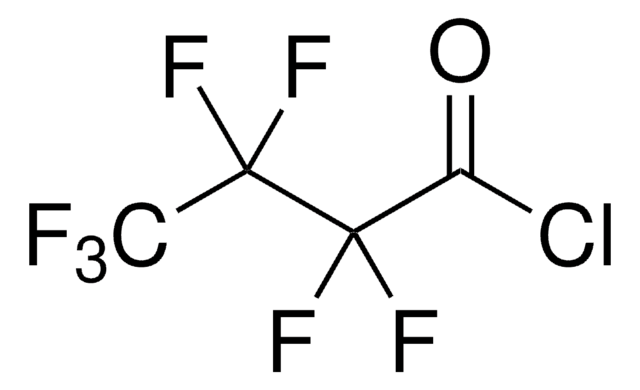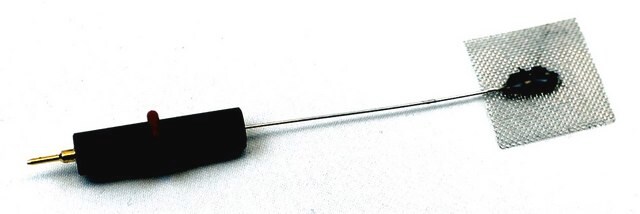267201
Platinum
wire, diam. 0.5 mm, 99.99% trace metals basis
Synonyme(s) :
Platinum element, Platinum gray
Se connecterpour consulter vos tarifs contractuels et ceux de votre entreprise/organisme
About This Item
Formule empirique (notation de Hill):
Pt
Numéro CAS:
Poids moléculaire :
195.08
Numéro CE :
Numéro MDL:
Code UNSPSC :
12141734
ID de substance PubChem :
Nomenclature NACRES :
NA.23
Produits recommandés
Niveau de qualité
Pureté
99.99% trace metals basis
Forme
annealed
wire
Résistivité
10.6 μΩ-cm, 20°C
Diamètre
0.5 mm
Point d'ébullition
3827 °C (lit.)
Pf
1772 °C (lit.)
Densité
21.45 g/cm3 (lit.)
Chaîne SMILES
[Pt]
InChI
1S/Pt
Clé InChI
BASFCYQUMIYNBI-UHFFFAOYSA-N
Catégories apparentées
Description générale
Platinum (Pt) is a highly ductile, malleable and unreactive metal. It is resistant to corrosion and stable at high temperatures. Although resistant to hydrochloric and nitric acid, it dissolves readily in hot aqua regia to form chloroplatinic acid.
Application
Pt wire may be used :
- as a microelectrode-indicator electrode in voltammetry
- as a transvascular embolic agent
- to study chronopotentiometry of hydrogen peroxide with a platinum wire electrode or
- in gas detection instruments.
Quantité
400 mg = 10 cm; 2 g = 50 cm
Code de la classe de stockage
13 - Non Combustible Solids
Classe de danger pour l'eau (WGK)
nwg
Point d'éclair (°F)
Not applicable
Point d'éclair (°C)
Not applicable
Faites votre choix parmi les versions les plus récentes :
Déjà en possession de ce produit ?
Retrouvez la documentation relative aux produits que vous avez récemment achetés dans la Bibliothèque de documents.
Les clients ont également consulté
Voltammetry with Stationary Microelectrodes of Platinum Wire.
Laitinen HA and Kolthoff IM
The Journal of Physical Chemistry, 45(7), 1061-1079 (1941)
Shai Rozen et al.
Plastic and reconstructive surgery, 131(6), 1253-1265 (2013-05-30)
Left untreated, paralytic lagophthalmos may result in corneal dryness, ulcerations, and subsequent blindness. The most common nondynamic surgical solution is upper eyelid weight placement in a superficial, pretarsal pocket, carrying the risk of visibility, extrusion, and entropion. The authors present
Muhammad Rashid et al.
Journal of nanoscience and nanotechnology, 13(5), 3627-3633 (2013-07-19)
Platinum nanoparticles (Pt NPs) were chemically deposited on a Nafion polymer electrolyte membrane by the impregnation-reduction (I-R) procedure to prepare an active electrode for solid electrochemical sensors. Various analysis methods such as SEM, EDX, XRD and cyclic voltammogram (CV) measurements
Wei Sun et al.
Materials science & engineering. C, Materials for biological applications, 33(4), 1907-1913 (2013-03-19)
In this paper a platinum (Pt) nanoparticle decorated graphene (GR) nanosheet was synthesized and used for the investigation on direct electrochemistry of myoglobin (Mb). By integrating GR-Pt nanocomposite with Mb on the surface of carbon ionic liquid electrode (CILE), a
Yuan Xiong et al.
Organic letters, 15(8), 1962-1965 (2013-04-12)
Metal-mediated rearrangements of 3-alkynyl flavone ethers are reported. The overall process involves 5-endo enyne cyclization to a platinum-containing spiro-oxocarbenium intermediate which may be trapped with methanol to produce spirodihydrofurans or further rearranged to afford either allenyl chromanediones or benzofuranones.
Notre équipe de scientifiques dispose d'une expérience dans tous les secteurs de la recherche, notamment en sciences de la vie, science des matériaux, synthèse chimique, chromatographie, analyse et dans de nombreux autres domaines..
Contacter notre Service technique



